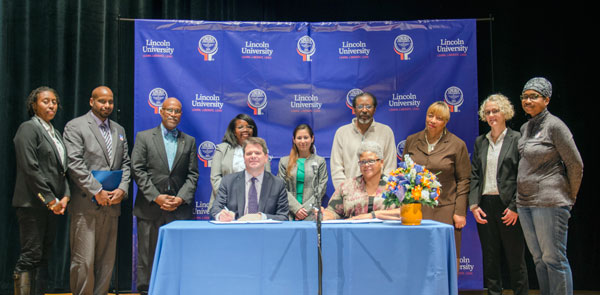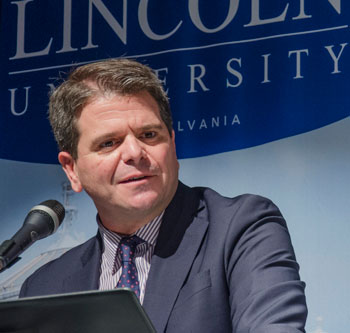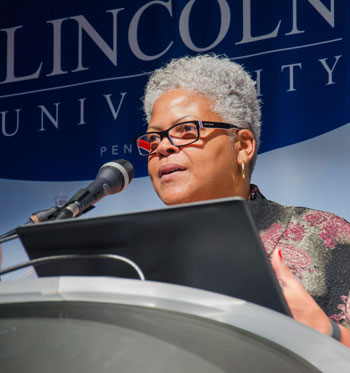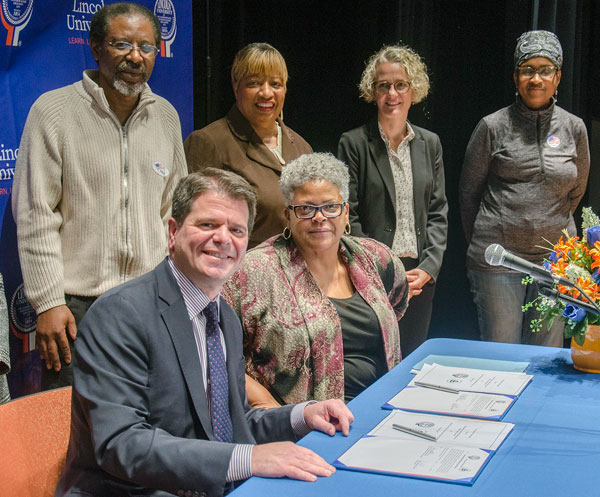- Posted in All University
- Category: Campus News

Front: EPA regional administrator, Cosmo Servidio & President Brenda A. Allen. Lincoln University. Back: Brittany Smith; Seitu Stephens, director of LU community and government relations; John Armstead ‘76, EPA director of land and chemicals division; Hana Hyland, EPA regional office small business coordinator; Noelle Watanabe, EPA life scientist & compliance officer; Dr. Patricia P. Ramsey, LU provost; Dr. Anna K. Hull, LU associate professor; Dr. Karen Baskerville, LU chair and professor of biology. Photo Courtesy of Lincoln University Staff/ Devin Bonner

EPA regional administrator Cosmo Servidio addresses faculty and staff at the MOU signing at the Ware Center Theater, November 6, 2018. Photo Courtesy Lincoln University Staff/ Devin Bonner
Lincoln University, Pa. – Today, President Brenda A. Allen and EPA regional administrator Cosmo Servidio joined together at the Ware Center Theater in front of many Lincoln faculty members and signed a renewed Memorandum of Understanding (MOU) to enhance research, teaching, outreach, career development and stewardship in the environmental sciences to promote:
- An environmental stewardship ethic in students, faculty, and staff;
- Innovative teaching and a commitment to community engagement;
- Increased representation of underrepresented/underserved communities with careers in environmental science and related fields; and
- The development of strategic partnerships to leverage resources to align support for institutional priorities.

President Brenda A. Allen addresses faculty and staff at the MOU signing at the Ware Center Theater, November 6, 2018. Photo Courtesy Lincoln University Staff/ Devin Bonner
“We couldn’t be more excited for the renewal of this partnership,” said Allen. “The University’s partnership with the EPA will provide high-impact and collaborative learning and research opportunities for our students and is part of Lincoln’s demonstrated commitment to developing strategic partnerships that enhance the education and professional development of our students and faculty.”
“EPA has a long history of partnership with Lincoln University and we are pleased to build on that success today,” said Servidio. “The partnership between EPA and Lincoln University continues to enhance the education and training of students so that we are prepared to meet the environmental challenges of the future, while helping to ensure that careers in science are open to every American regardless of race or ethnicity.”
Building on the success of the original MOU between Lincoln University and the EPA signed in 2002, the new MOU aims to:
- Support and promote student learning, internships, career development and employment in environmental sciences and related fields;
- Enhance Lincoln University faculty and EPA employee professional development in environmental sciences, and related fields;
- Provide Lincoln University faculty with technical assistance support;
- Support the enhancement of Lincoln University’s environmental sciences curriculum;
- Identify and promote opportunities in designing and implementing public-private partnerships to support environmental stewardship;
- Support community development, engagement opportunities for Lincoln University students, partnerships with regional communities and potential career opportunities with the surrounding communities on environmental, health, and economic issues; and
- Support capacity building efforts to increase Lincoln University’s participation in federal programs at EPA.

EPA regional administrator Cosmo Servidio and President Brenda A. Allen, Ph.D. sign the renewed memorandum of understanding between Lincoln University and the EPA at the Ware Center Theater, November 6. Photo Courtesy Lincoln University Staff/ Devin Bonner
Lincoln University, the nation’s first degree-granting Historically Black College and University (HBCU), educates and empowers students to lead their communities and change the world. It does so by: providing a rigorous liberal arts education featuring active and collaborative learning; integrating academic and co-curricular programs with the University’s distinctive legacy of global engagement, social responsibility and leadership development; and cultivating the character, values, and standards of excellence needed to enable students to become responsible citizens of a global community.